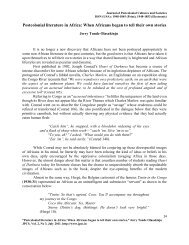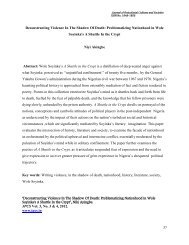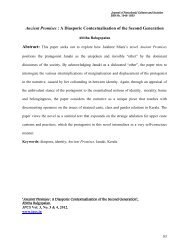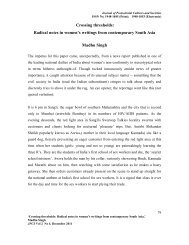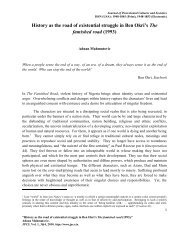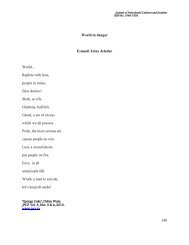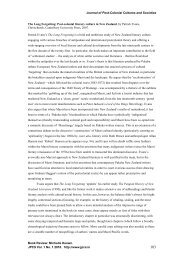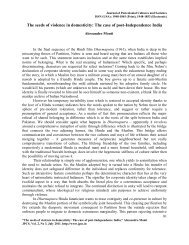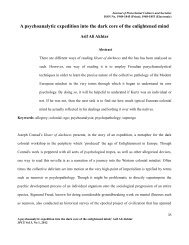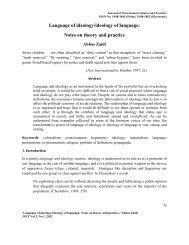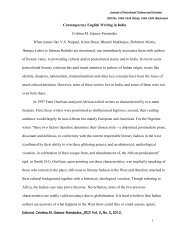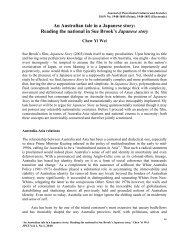Darwinist premise in the Orientalist construction of the âOtherâ - JPCS
Darwinist premise in the Orientalist construction of the âOtherâ - JPCS
Darwinist premise in the Orientalist construction of the âOtherâ - JPCS
Create successful ePaper yourself
Turn your PDF publications into a flip-book with our unique Google optimized e-Paper software.
Journal <strong>of</strong> Postcolonial Cultures and Societies<br />
ISSN No. 1948-1845 (Pr<strong>in</strong>t); 1948-1853 (Electronic)<br />
civilization. It is for this reason that, throughout his work, he looks forward with equanimity<br />
or even with satisfaction to <strong>the</strong> imm<strong>in</strong>ent exterm<strong>in</strong>ation <strong>of</strong> all primitive peoples (1-12)<br />
If literature is a figurative representation <strong>of</strong> human experience, and if <strong>the</strong> fundamental<br />
elements <strong>of</strong> biological existence are organisms, environments, and actions, <strong>the</strong> figurative<br />
elements that correlate with <strong>the</strong>se biological elements would naturally assume a predom<strong>in</strong>ant<br />
position with<strong>in</strong> most figurative structures. Evolutionary <strong>the</strong>ory can thus provide a sound<br />
rationale for adopt<strong>in</strong>g <strong>the</strong> basic categories as well as <strong>the</strong> <strong>the</strong>oretical assumptions that govern<br />
<strong>the</strong> structural underp<strong>in</strong>n<strong>in</strong>g <strong>of</strong> human relationship. Hence, <strong>in</strong> its <strong>construction</strong> <strong>of</strong> <strong>the</strong> “Oriental<br />
O<strong>the</strong>r”, Orientalism tended to assimilate <strong>the</strong> Darw<strong>in</strong>ian paradigm. This is obvious <strong>in</strong> <strong>the</strong><br />
depiction <strong>of</strong> <strong>the</strong> Oriental characters, sett<strong>in</strong>gs, and actions which constitute a s<strong>in</strong>gle,<br />
cont<strong>in</strong>uous body <strong>of</strong> stereotypical, essentialist, <strong>Orientalist</strong> thought. Consider Shakespeare’s<br />
“Caliban”, Defoe’s “Friday”, or Conrad’s “Niggers,” to mention but a few. In his early work,<br />
Kipl<strong>in</strong>g had made <strong>the</strong> landscapes and culture <strong>of</strong> India a fantasy that recuperates <strong>the</strong><br />
sensations <strong>of</strong> savagery. In She and K<strong>in</strong>g Solomon’s M<strong>in</strong>es, H. Rider Haggard comb<strong>in</strong>es tales<br />
<strong>of</strong> fabulous adventure with ethnographic descriptions <strong>of</strong> Africa. Much <strong>of</strong> Conrad’s early<br />
fiction is set <strong>in</strong> <strong>the</strong> jungles. In Heart <strong>of</strong> Darkness, he broods over <strong>the</strong> spirit <strong>of</strong> <strong>the</strong> African<br />
wilderness. Journey<strong>in</strong>g <strong>in</strong>to <strong>the</strong> wilderness is “like travel<strong>in</strong>g back to <strong>the</strong> earliest beg<strong>in</strong>n<strong>in</strong>gs<br />
<strong>of</strong> <strong>the</strong> world, when vegetation rioted on <strong>the</strong> earth and <strong>the</strong> big trees were k<strong>in</strong>gs’” (40). Marlow<br />
sums his tale <strong>of</strong> <strong>the</strong> wilderness as “one <strong>of</strong> <strong>the</strong> dark places <strong>of</strong> <strong>the</strong> earth” ( 5). In Lord Jim,<br />
Conrad writes “… that 'giv<strong>in</strong>g your life up to <strong>the</strong>m' (<strong>the</strong>m mean<strong>in</strong>g all <strong>of</strong> mank<strong>in</strong>d with sk<strong>in</strong>s<br />
brown, yellow, or black <strong>in</strong> colour) ‘was like sell<strong>in</strong>g your soul to a brute.'” (284)<br />
Influenced and encouraged by Darw<strong>in</strong>ism, many Victorians not only scientists and<br />
anthropologists, but also <strong>the</strong> popular fiction associated with imperialism and <strong>the</strong> idea <strong>of</strong><br />
Empire (Griffith 179). The idea <strong>of</strong> <strong>the</strong> <strong>in</strong>compatibility <strong>of</strong> ethical or cultural norms, <strong>the</strong>n,<br />
revolved around <strong>the</strong> sense <strong>of</strong> racial associations. Diversity, <strong>the</strong>refore, could be only a codeword<br />
for racial difference.<br />
In fact, Darw<strong>in</strong>ian Theory promotes <strong>the</strong> idea <strong>of</strong> war, and regards peace as an element that<br />
retards progress. “Evolutionary anthropology has focused on <strong>the</strong> orig<strong>in</strong>s <strong>of</strong> war, or ra<strong>the</strong>r<br />
ethnocentricity, because it epitomizes <strong>the</strong> problem <strong>of</strong> group selection, and because war may<br />
itself have been <strong>the</strong> ma<strong>in</strong> agent <strong>of</strong> group selection” (Dawson 79). This l<strong>in</strong>e <strong>of</strong> thought is<br />
embodied <strong>in</strong> Vladimir Jabot<strong>in</strong>sky’ statement: “Stupid is <strong>the</strong> person who believes <strong>in</strong> his<br />
neighbor, good and lov<strong>in</strong>g as <strong>the</strong> neighbor may be. Justice exists only for those whose fists<br />
and stubbornness make it possible for <strong>the</strong>m to realize it . . . Do not believe anyone, be always<br />
on guard, carry your stick always with you – this is <strong>the</strong> only way <strong>of</strong> surviv<strong>in</strong>g <strong>in</strong> this wolfish<br />
battle <strong>of</strong> all aga<strong>in</strong>st all” (qtd. <strong>in</strong> Bruzonsky 19). This is actually <strong>the</strong> Fascist ideology <strong>of</strong><br />
Darw<strong>in</strong>ism that cont<strong>in</strong>ues to pose a threat to <strong>the</strong> world <strong>in</strong> <strong>the</strong> 21 st century. Those who have<br />
<strong>the</strong> power/knowledge or <strong>the</strong> force <strong>of</strong> imposition <strong>in</strong> <strong>the</strong> <strong>Orientalist</strong>/colonialist thought would<br />
survive chiefly because <strong>the</strong>y were <strong>the</strong> "fittest”, hence more successful at warfare. "The tamest<br />
are <strong>the</strong> strongest," wrote Walter Bagehot, <strong>the</strong> first avowed social <strong>Darw<strong>in</strong>ist</strong>. (qtd. <strong>in</strong><br />
Dawson81)<br />
‘<strong>Darw<strong>in</strong>ist</strong> <strong>premise</strong> <strong>in</strong> <strong>the</strong> <strong>Orientalist</strong> <strong>construction</strong> <strong>of</strong> <strong>the</strong> “O<strong>the</strong>r”,’ Mohamed Hamoud Kassim Al-<br />
Mahfedi and Venkatesh P<br />
<strong>JPCS</strong> Vol 3, No 1, 2012<br />
14



